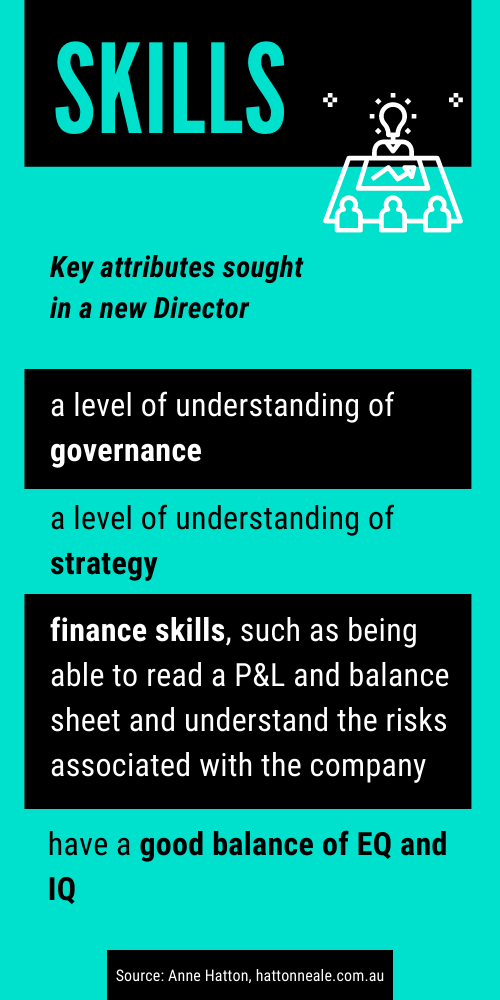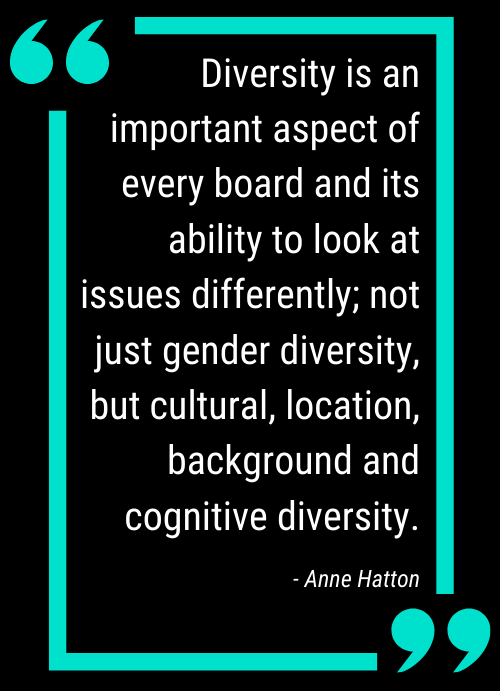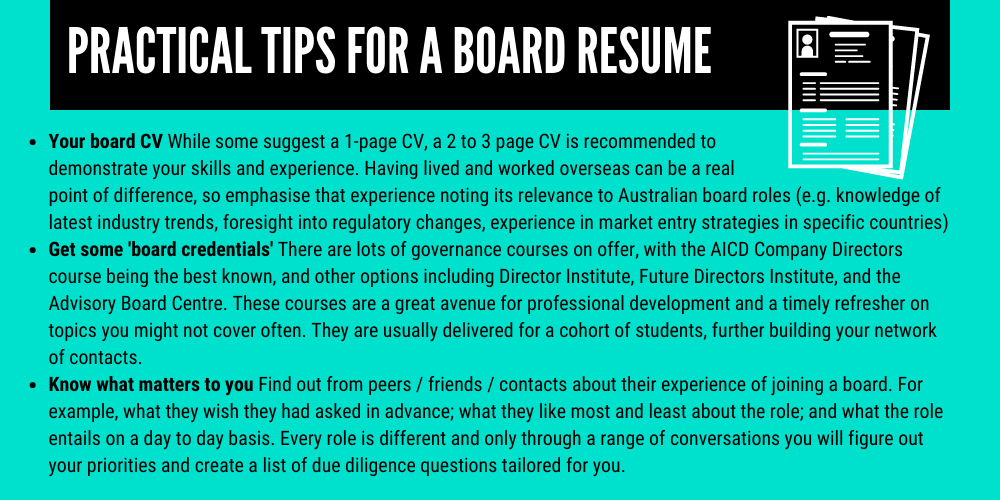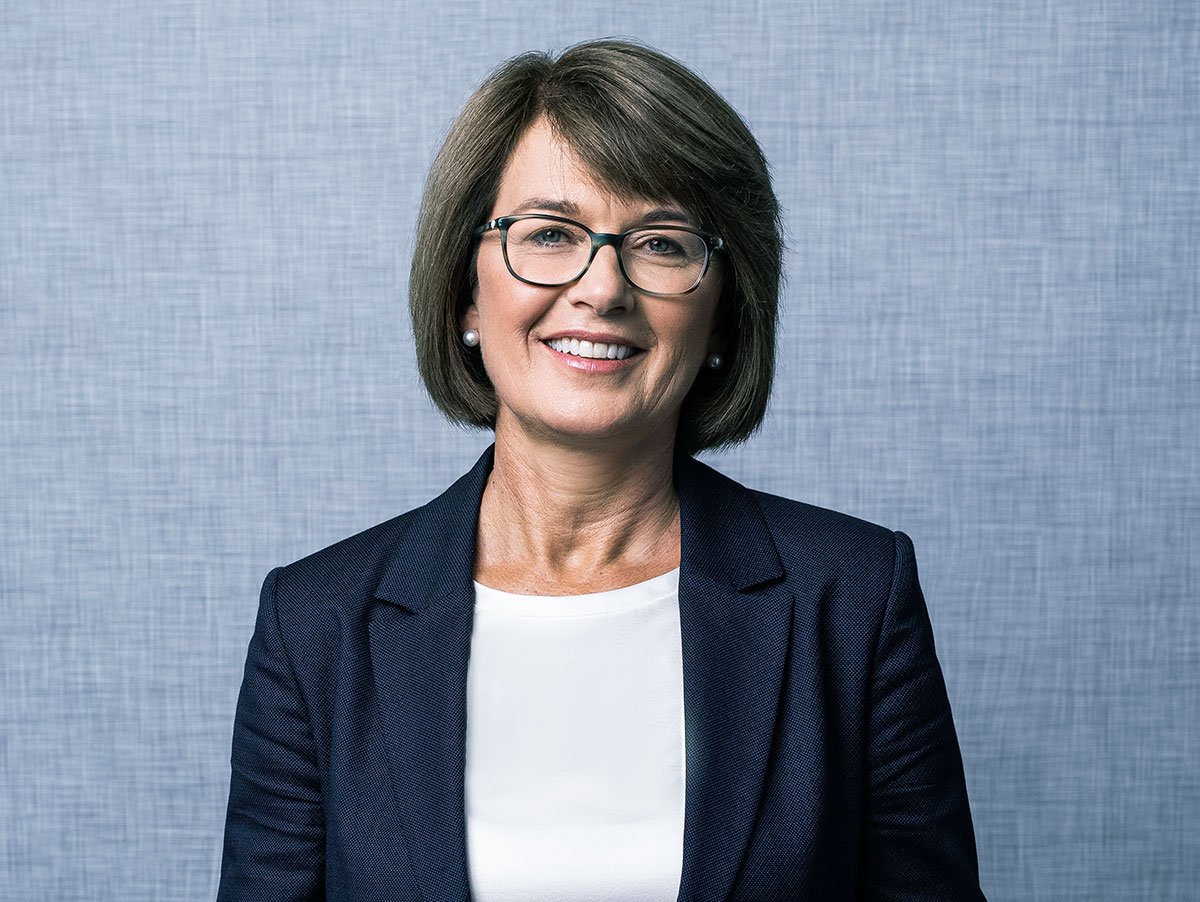Many Advance members consider joining a governance or advisory board of an Australian firm when returning to Australia, or while working overseas. Advisory board expert Anne Hatton from Hattonneale gives us a snapshot of the board environment in Australia.
The current state of play for the board community

There are many Australian publicly listed companies, private and international companies, member-based organisations, and not for profits with independent boards of directors.
Some of these companies have international operations or ambitions for international growth.
The definition and expectations of a non-executive director in the Australian context are outlined here. It is also important to understand the differences and requirements of an advisory board (also called an advisory panel or advisory committee) compared to the fiduciary responsibilities of a full governance board.
While Australian firms tend to be domestically focussed, there is increased demand for people who have offshore experience and understand how to expand businesses into foreign markets.
The pandemic has impacted the board community in many ways – with increased demands and frequency of meetings due to dramatically changing business circumstances, lengthy sessions online, and reduced face-to-face contact and travel. While some board directors have welcomed these changes, it has facilitated a heightened awareness that directors cannot take on too many board commitments, and a reassessment of the purpose of boards. As a result of some directors stepping down, strong demand continues for new directors with fresh insights and technical skills.
While perspectives on board composition are evolving, there are key attributes that boards seek when appointing a new director (see insert). Boards also want to ensure alignment of cultural values with the organisation’s values, and that the skills and experiences the candidates’ bring complement and enhance the skills of the incumbent directors.
Expertise most in demand on boards
Given the ongoing and accelerating impact of technology on business models and how businesses service their customers, there is a constant demand for people who have an understanding of technology and digital disruption in businesses.

On every board there is always a need for someone with strong financial and commercial expertise. As we move out of the pandemic, there will be much greater emphasis on growth, and on M&A opportunities – with significant M&A activity happening in Australia and globally.
There is also continued demand for people who have run businesses (ie. former CEOs, former group executives that have run operating businesses), to provide an insight into effective P&L management and how to lead teams.
Importantly, there has been a a shift in recent years back to boards having higher numbers of directors around the table with relevant domain expertise. For example, in many financial services companies, particularly ASX listed companies, boards are seeking candidates with deep experience in financial services and familiarity with relevant financial regulatory bodies.
Demand for diversity on Australian boards continues, with initiatives such as the 30% Club achieving its goal in late 2018 of 30% of ASX200 board roles filled by women. While the 30% Club has extended its goals, there is a growing focus on thinking about diversity in all its forms: skills diversity, ethnic diversity, and importantly diversity of cognitive thinking.
In this context, a career path that includes significant overseas experience enables you to bring different thinking to the table, and should be a positive consideration for board diversity.
Boards are looking for collaborative people, good listeners, who have value to add and are confident to put their voice forward.
Networks still remain really critical
For those coming out of executive roles, it can be hard to suddenly transition to a board role without strong networks in place. Learning from the experience of others who have transitioned to a board role, and building your relationships with established board directors is critical. In addition, it is important to build contacts in the board search community, with firms like Hattonneale, who have knowledge of board vacancies and search processes.
Leverage your networks. People love to connect with people, and Covid has made virtual connections a viable substitute for meeting in-person, which is particularly helpful for global Australians. But one thing that directors feel less comfortable with is being asked to find candidates roles or place them on their boards. Directors are very generous with their time when they are being asked to provide advice and guidance. Often, they will refer candidates to other directors or relevant individuals which will help candidates build local networks.
Be patient. The biggest challenge when candidates are commencing their board careers or looking for a board role to complement their executive roles, is taking the time to build those networks, then go through multiple board processes to obtain a successful appointment. Even if a candidate’s skills and experience are in high demand, it can be difficult to navigate which opportunity is most suitable. Each role requires significant due diligence, so establishing a framework to assess which opportunities are of interest before going through the interview process is helpful in saving the mental space for the right opportunities, and enables candidates to determine where they will best add value. The effort to find a board role can be on par with finding an executive position, so patience is key to avoid accepting a role that is not the best fit.
Key questions to ask yourself
When transitioning to a board career, or seeking a board role, consider:
- Why do you want to be a board director? Not everyone should be a board director or necessarily has the skills or mindset to make a contribution as a board director, so this is a question to strongly reflect on.
- What is the value that you will bring to an organisation as a non executive director? There are many risks associated with being a director and it is important to understand what they are, to have a level of confidence and comfort around understanding those risks and the ability to make a contribution.
It takes time to switch into a governance mindset, and not feel that you have to solve all the problems and get involved in the execution of the strategy.
The transition from being a senior executive, a decision maker, or a leader, to a board director largely involves listening, guiding, supporting and adding value. Directors are there to ask the right questions to help management execute on the strategy, and ensure management have thought of all potential scenarios before making decisions.

For more resources and details about board roles in Australia, check out Australian Institute of Company Directors, Director Institute, Future Directors Institute, and Advisory Board Centre.
Advance brings this and other practical advice for those trying to navigate their way back to Australia, every quarter at the #CoffeeHour.
